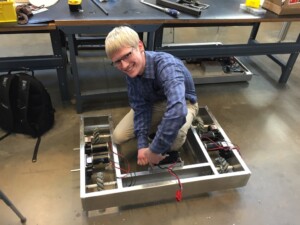What is the Problem With Professional Development?

What is the problem with professional development? The biggest problem is the way we frame it with the language that we use, and the thoughtless interpretation and implementation that we apply. What if we shifted the concept from professional development to professional growth, from what is expected of us by others to a promise we make to ourselves?
Good professional development, or what I like to refer to as professional growth, is like good teaching, or what I refer to as educating the student. To me, it’s the same as good curriculum — planning without a plan, structured, yet flexible, applicable, relevant, and engaging. I have been inspired by a few examples in my 14 years of teaching. Most of the good examples occur when I seek them out myself. I learn more when I want to, when I am curious, when I have a mentor guiding and supporting me, and when the passion and questions posed inspire true change in my heart. Being educated and growing must be ongoing, and must aim to achieve excellence rather than mediocrity. Just like our students, we do not want our time wasted, and we do not want impersonal, standardized material.
I Googled ‘Professional Development,’ which is a term we use a lot in education. One definition states, “Professional Development is the continuous process of acquiring new knowledge and skills that relate to one’s profession, job responsibilities, or work environment. It plays a key role in maintaining trained, informed, and motivated employees, regardless of job classification.” Is this an example of educational language that confines or expands our understanding? Is this a good definition? Let’s look at what Dwayne Huebner and Grant Wiggins might add to our thinking.
In 1966, Dwayne Huebner explained that curricular language is filled with various dangerous myths. These are not dangerous because they are myths, but rather because they remain non-recognized and unchallenged. “The educator accepts as given the language which has been passed down to him by his historical colleagues.” What exactly does this mean? What Huebner is describing in his article “Curricular Language and Classroom Meaning,” is that this educational language that we use must be put to the test. We need to question and challenge its effectiveness and expose its flaws.
With the term professional development, it’s the schema associated with the term that I think Heubner would deem dangerous. He goes on to state, “Too often, today, promise is replaced by demand, responsibility by expectations, and conversation by telling, asking, and answering.” How does this relate to professional development? How much of your professional development is demanded by others rather than promised to yourself? How much is expected of you rather than you taking responsibility? Is professional development an ongoing conversation, or something you are told to do?
When we replace the words demand with promise, and expectations with responsibility, we grant ownership, and include obligation. Responsibilities impact the community even though it is individuals who own them. Expectations are shallow when demanded by others, rather than promised to ourselves. In order to grow professionally, we do not need to attend trainings at staff development centers because someone tells us to attend, yet that is what we do. The language demands that of us. We standardize it. We assume that there has to be a specific, definable goal associated with the professional development, rather than viewing it as growth, which allows it to have intrinsic value. Professional growth should inspire and create positive change in our life. Professional growth is our responsibility. We need to get to the point where we want to improve, learn, inspire, be inspired, and strive for excellence. Professional development, just like any other type of growth, should be an ongoing search for knowledge. It is the experience.
The National Staff Development Council states that professional development, “Means a comprehensive, sustained and intensive approach to improving teachers’ and principals’ effectiveness in raising student achievement.” Is this an example of professional development language that Huebner would call dangerous, standardized, and in need of being challenged?
I suspect that Grant Wiggins would define this type of language as stupidification. He warns against “stupidification” in his post “Avoiding Stupidification.”
Stupidification (n): 1. A deadly illness in which perfectly good ideas and processes are killed as a result of thoughtless interpretation and implementation. 2. The reducing of intricate issues and processes to simplistic, rigid, and mandated policies, in the impatient quest for quick fixes to complex problems.
How often does the language that we use and the actions we take related to professional development equate to stupified expectations rather than inspiring responsibilities?
What is the problem with professional development? We must find the language that allows us to see professional growth as ongoing. We do not magically become professionally developed. As professionals, we are obligated to develop the language that leads to understanding the complexities of curricular issues and processes. This will allow us to take perfectly good ideas and processes and thoughtfully interpret and implement them as needed.







Kathy Dyer
Courtney, your comment about not becoming “magically professional developed” seems sadly true. Professional learning and growth is important. Much like the professions of law and medicine, educators need to be self directed learners to improve their practice. And fortunately our opportunities to do that are changing. New learning, supported by PLCs (professional learning communities) or TLCs (teacher learning communities), that provides the opportunity for sharing, reflecting, giving and getting feedback and learning new things allow us as educators to grow professionally and keep it relevant. I’ve talked about this more in depth here…
http://www.nwea.org/blog/2012/what-matters-in-teacher-professional-development/
Dennis Deets
I think we might abandon the term "professional development". The term has run its course.
I propose we adopt the term "leveling up". As a teacher then, rather than talking about attending professional development in which the mastery of transfer skills may not be clear, I might talk about leveling up my teaching skills. I might then think about what i need to do to level up. In addition, it might become clear to me that i need to level my teaching up to the appropriate level necessary for participation in the 21st century education expansion. I might see that playing the 'classic' content may be enjoyable for me but may not be supporting my guild and my students.